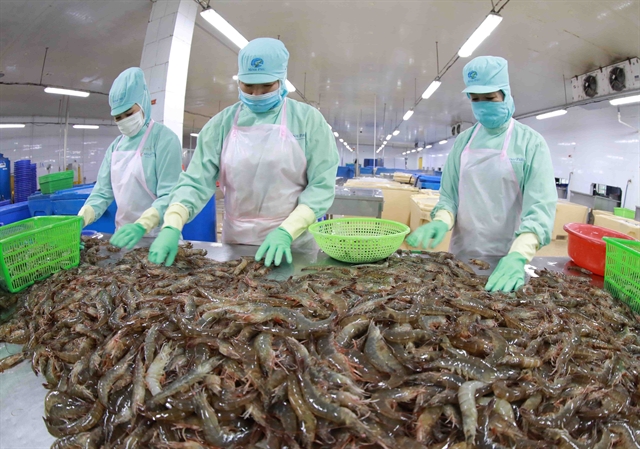 Economy
Economy


|
| Workers process shrimp for export on a production line. — VNA/VNS Photo Vũ Sinh |
HÀ NỘI — The seafood industry grew rapidly in the third quarter of last year, but there are signs of a slowdown in the fourth quarter and it is expected to continue this year, particularly in large markets.
According to experts, even though rising inflation has a negative impact on import markets and high material costs result in declining profit, seafood businesses are still supported by some positive factors.
KB Việt Nam Securities Company (KBSV) said that the seafood industry has already hit its peak. The securities firm expected that seafood exports are not optimistic as higher inflation caused stagnation in purchasing demand.
Moreover, some enterprises’ profits hit peaks in 2022, which is a sign that the industry is entering the declining cycle.
KBSV also sees the prices of raw shrimp and pangasius remaining high despite recent declines. Although material prices are expected to fall in 2023, high feeding costs and the faster decrease in selling prices will directly affect enterprises’ gross profits.
But there are still some positive factors that can support the seafood industry in 2023, including the reopening of Việt Nam's largest seafood export market, China, after lifting the "zero-COVID" policy, as it can boost demand at restaurants and hotels, KBSV said.
While export volumes to China are expected to increase, rising inventories at the factories' warehouses, high output, and a bearish trend in raw fish prices make it difficult for Việt Nam’s pangasius exports to post a breakthrough.
Vietnamese pangasius also has to compete fiercely with China’s tilapia. Therefore, KBSV believes that the reopening of China just lessens the strain on growth rather than causing a boom in this sector.
In contrary, the lower freight charges help businesses reduce the burden of logistics costs and offset profit margins when they have to discount selling prices, while seafood exporters to the US market such as Vĩnh Hoàn and Sao Ta Foods (HoSE: FMC), may benefit if the USD advances.
Meanwhile, an expert from SSI Securities Corporation (SSI) said that in 2023, inflation will continue to be a challenge amid slow inventory turnover.
The securities firm forecasts the inventory will be fully cleared sometime in the third quarter of 2023, with orders beginning to be signed by that time.
It also warns that China is a price-sensitive market, and the average selling price to this market is always about 40 per cent lower than the average selling price to the US market.
Therefore, SSI believes that revenue from the Chinese market will partially offset the decline in revenue from the US and EU markets, but not enough to help companies recover profits in the first half of 2023. This may be due to the high level of comparative profitability in 2022.
SSI also forecasts that the profits of pangasius companies will decrease in 2023.
The securities firm expects that the average selling price will decrease by 20-30 per cent year-on-year in 2023 and that the cost of aquafeed will also go down.
With a slow increase in orders, there will be no shortage of supply for both raw shrimp and fish; thereby, it is expected that the price of raw shrimp and fish will fall slightly due to weak demand until the end of the first half of 2023.
SSI believes that the gross margin of seafood businesses will decrease in 2023. With interest rates expected to remain high for the whole year, rising financial costs will continue to affect net profit margins, especially for companies with high leverage, such as I.D.I International Development & Investment Corporation (HoSE: IDI). Overall, SSI forecasts companies to post negative earnings growth in 2023.
In fact, in 2022, the seafood industry had a very positive growth. Therefore, the decline in profit this year is due to a high comparative base.
Due to a negative business outlook and the downtrend in the stock market, the seafood industry's share prices fell 13 per cent last year. The industry's shares quickly fell when quarterly profit growth slowed. Shares of key companies fell during the period, such as FMC was down 36 per cent, and IDI was down 27 per cent.
Seafood stock valuations could fall to the industry's historically low level of 4x through the third quarter of 2023 as earnings are expected to edge down from the high base level for 2022, said SSI. — VNS




